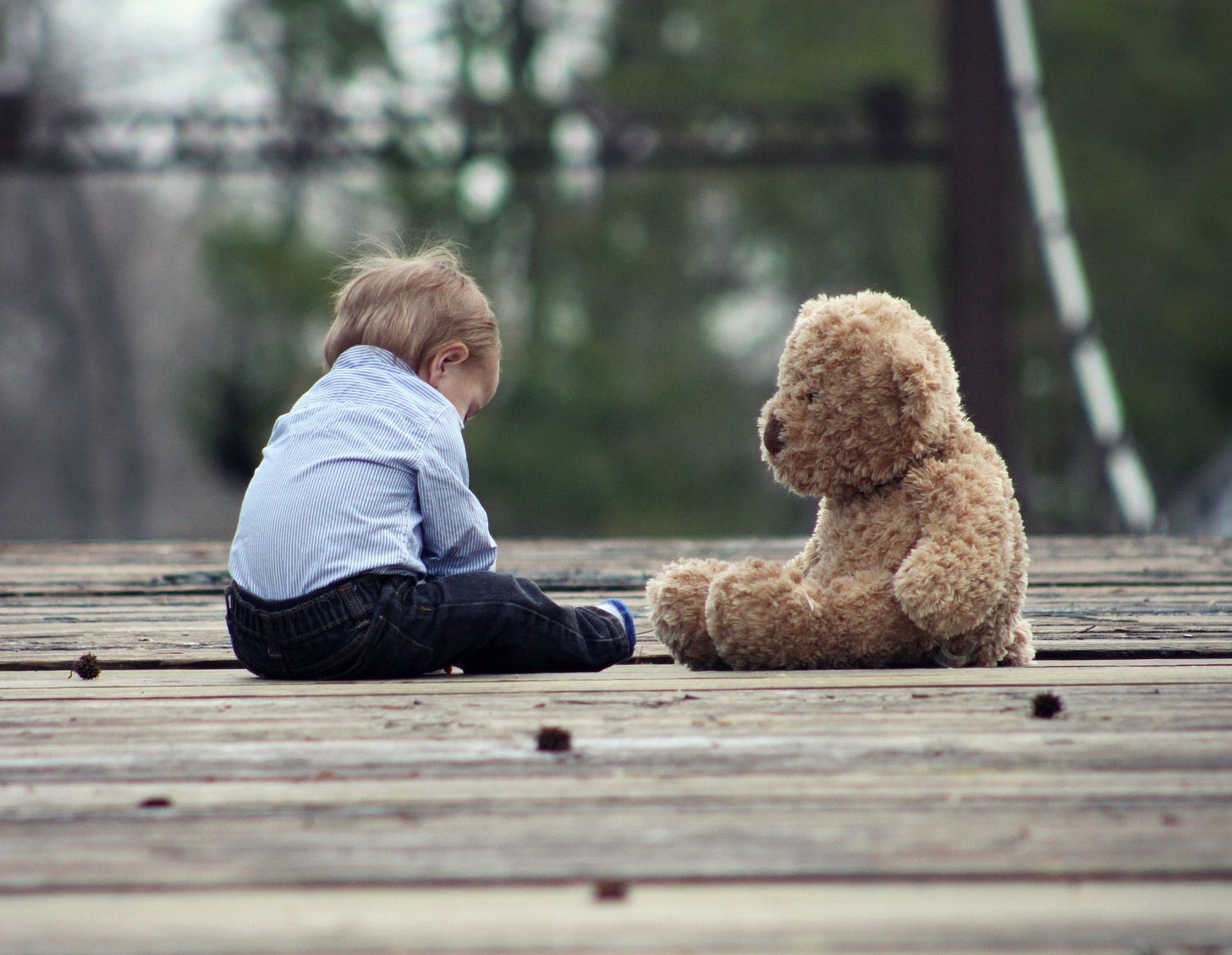Unseen Scars: Understanding and Supporting Children's Mental Health after Mass Shootings
This post explores the impact of mass shootings on children's mental health and offers guidance for parents and educators to recognize signs of distress and provide appropriate support.
Summary: This blog highlights the unseen psychological impacts of mass shootings on children and the importance of recognizing distress signs. It aims to provide guidance for caregivers and educators on support strategies and emphasize the vital role of educators. Key points include fostering safe spaces, open dialogue, comfort, coping mechanisms, and educator-parent-professional collaboration.
Keywords: mass shootings, children's mental health, PTSD, anxiety, trauma, coping strategies, parental support, educators, psychological effects
Photo by Katerina Holmes
As parents and educators, we all want to protect and nurture the children in our lives. However, in the face of recent mass shootings, it's become increasingly difficult to shield them from the harsh realities of gun violence. While we might be aware of the immediate dangers, the long-term psychological effects on children are often less visible but just as significant. Today, we'll explore these unseen scars and offer guidance on how to recognize signs of distress and provide appropriate support to our children.
The Psychological Effects of Mass Shootings on Children
Children exposed to mass shootings, either directly or indirectly, can suffer from a range of psychological issues. Some of the most common effects include:
Anxiety: Following a mass shooting, children may feel an overwhelming sense of fear and anxiety. They might worry about their own safety, the safety of their loved ones, or the possibility of another shooting occurring.
Post-Traumatic Stress Disorder (PTSD): Children who have been directly exposed to gun violence may develop PTSD. This can manifest in symptoms such as nightmares, flashbacks, or persistent, intrusive thoughts about the traumatic event.
Grief and Loss: The sudden and violent nature of mass shootings can lead to intense feelings of grief and loss, particularly if the child knew someone who was injured or killed in the incident.
Depression: Prolonged exposure to news coverage or discussions about mass shootings can contribute to feelings of helplessness and sadness, potentially leading to depression.
Behavioral Changes: In the aftermath of a mass shooting, children may exhibit behavioral changes, such as aggression, withdrawal, or difficulty concentrating.
Photo by Pixabay
Recognizing Signs of Distress
As parents and educators, it's crucial to be aware of the signs that a child may be struggling with the psychological effects of gun violence. These signs can include:
Changes in sleep patterns, such as nightmares or difficulty falling or staying asleep
Unusual irritability or mood swings
Loss of interest in activities they once enjoyed
Persistent worry or fear
Avoidance of places, people, or activities that remind them of the traumatic event
Difficulty concentrating or staying focused
“When a traumatic event happens, it's important for parents and educators to create a safe and supportive environment for children to express their emotions and process the experience." - Dr. Bruce D. Perry, Senior Fellow at the ChildTrauma Academy
Providing Support and Encouragement
If you suspect that a child in your care is struggling with the emotional fallout of a mass shooting, there are several steps you can take to offer support and encouragement:
Create a Safe Space: Ensure that the child feels safe and secure in their environment. Offer reassurance and be available to answer any questions or concerns they may have.
Encourage Open Communication: Foster an open dialogue about the child's feelings and emotions. Encourage them to express their thoughts and concerns, and validate their feelings.
Offer Comfort and Reassurance: Let the child know that their feelings are normal and understandable. Offer comfort and reassurance, and remind them that they are safe and loved.
Encourage Healthy Coping Strategies: Teach children healthy ways to cope with their emotions, such as deep breathing exercises, meditation, or engaging in activities they enjoy.
Seek Professional Help: If a child's symptoms persist or worsen, it may be necessary to seek professional help from a mental health professional who specializes in trauma and PTSD.
Photo by Katerina Holmes
The Role of Educators
Educators play a vital role in supporting children's mental health following mass shootings. Here are some ways teachers and school administrators can help:
Create a Supportive Classroom Environment: Cultivate a sense of safety and security within the classroom by fostering open communication, encouraging students to express their emotions, and offering reassurance.
Address the Topic Sensitively: When discussing mass shootings, approach the subject with sensitivity, ensuring age-appropriate language and content. Encourage students to ask questions and share their feelings.
Identify Struggling Students: Keep an eye out for students who may be exhibiting signs of distress, and reach out to offer support or recommend resources.
Implement Trauma-Informed Teaching Practices: Adopt trauma-informed teaching practices to better understand and support students who have experienced trauma. This includes providing structure, predictability, and consistent routines to create a stable learning environment.
Collaborate with Parents and Mental Health Professionals: Work closely with parents and mental health professionals to ensure that struggling students receive the support they need both at school and at home.
In conclusion, the psychological effects of mass shootings on children are complex and far-reaching. As parents and educators, it is our responsibility to recognize the signs of distress and provide appropriate support to help children cope with and heal from these traumatic events. By working together and fostering a safe and nurturing environment, we can make a difference in the lives of our children and help them build resilience in the face of adversity.
In "The Boy Who Was Raised as a Dog: And Other Stories from a Child Psychiatrist's Notebook--What Traumatized Children Can Teach Us About Loss, Love, and Healing," renowned child psychiatrist Dr. Bruce D. Perry and co-author Maia Szalavitz delve into the world of childhood trauma through a series of compelling case studies. Drawing on Dr. Perry's extensive clinical experience, the book explores the profound effects of trauma on young minds and highlights the resilience of children in the face of adversity.
Through these deeply moving and often surprising stories, readers gain insight into the complex workings of the developing brain, the power of human connection, and the importance of empathetic, trauma-informed care. The book offers hope, inspiration, and practical guidance for parents, educators, mental health professionals, and anyone invested in the well-being of children who have faced trauma.
If you found this blog post helpful and informative, we urge you to take a moment to share it with your friends, family, and colleagues. By spreading awareness and fostering a deeper understanding of the psychological effects of mass shootings on children, we can help parents, educators, and mental health professionals recognize signs of distress and provide the necessary support to aid in healing.
Please take a moment to share this blog post on your social media platforms, email it to your contacts, or discuss it with others in your community. Every share counts, and your contribution can help create a more informed and supportive environment for children who are coping with the aftermath of traumatic events.
Dear readers, your thoughts and experiences are invaluable to our community, and we would love to hear from you. If you found our blog post on "Unseen Scars: Understanding and Supporting Children's Mental Health after Mass Shootings" insightful or helpful, we encourage you to take a moment to leave a comment below.






An active shooting is underway at and around the Old National Bank in downtown Louisville. It breaks my heart...